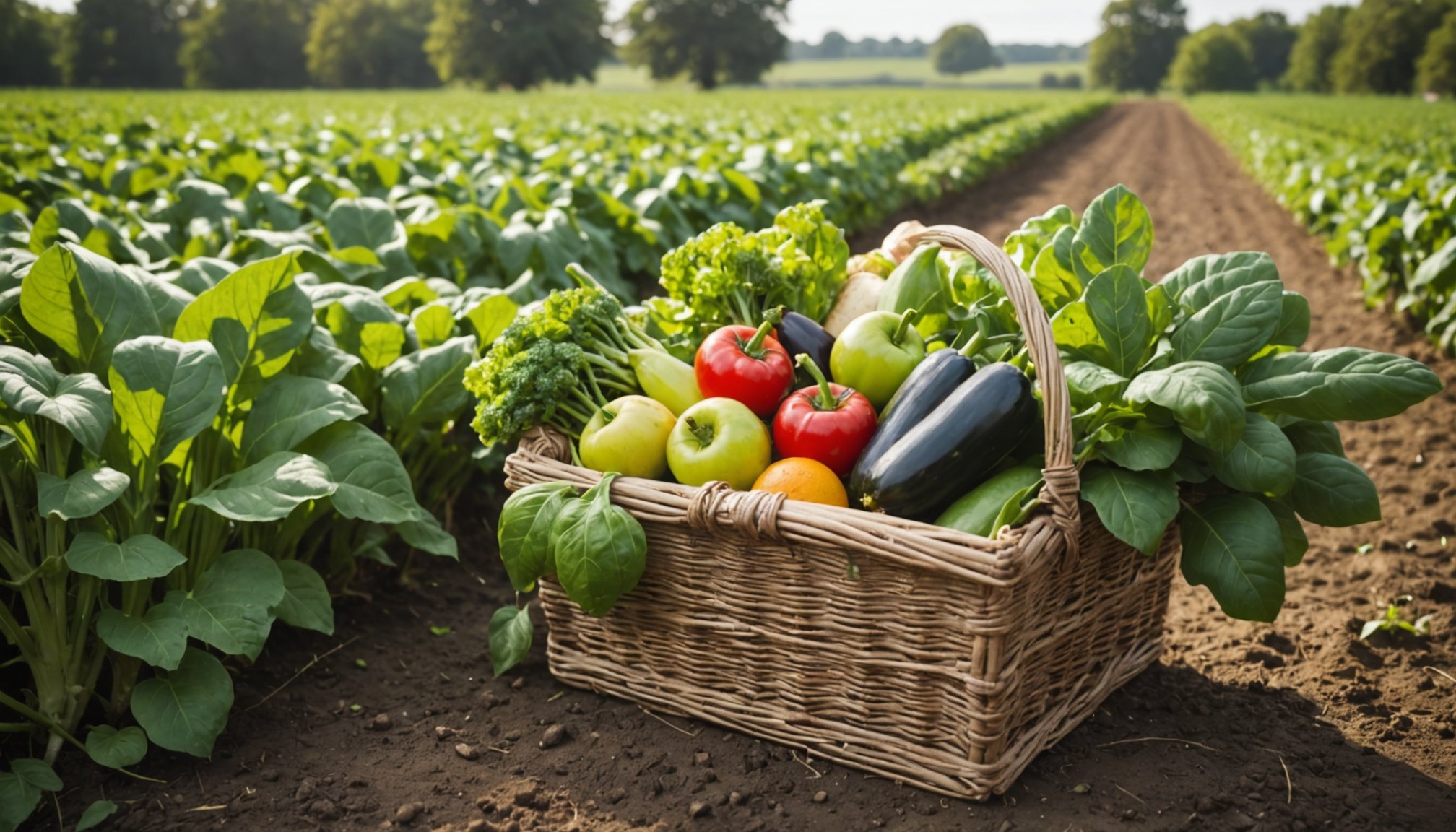Overview of Organic Food Certification Standards in the UK
Delving into the organic food certification system in the UK reveals a structured approach designed to ensure consumers receive products that meet stringent ecological and ethical criteria. At its core, organic food certification serves the dual purpose of guaranteeing that food products are produced sustainably and informing consumers about the authenticity of these claims. This certification is a critical element for maintaining trust and integrity in the organic marketplace.
The regulatory body currently overseeing certification standards in the UK is the Department for Environment, Food & Rural Affairs (DEFRA). DEFRA works closely with several accredited certification bodies. These organisations are responsible for ensuring that the UK’s standards align with both domestic and international expectations, thereby fostering consistency and reliability in organic production.
A lire également : Essential Guide: New Travel Rules for UK Tourists Heading to the Schengen Area After Brexit
The evolution of certification standards in the UK has seen significant changes, reflecting advancements in agricultural practices and societal demands for better environmental accountability. This historical context underscores a transition from rudimentary oversight to a comprehensive regulatory framework, prioritising the well-being of both the ecosystem and the consumer.
Understanding these elements provides clarity on how the UK maintains high standards in organic production, marking the country as a leader in sustainable agriculture.
Cela peut vous intéresser : Essential Guidelines for Introducing Protected Plant Species in UK Gardens: A 2023 Overview
Key Requirements for Certification
Achieving certification in organic farming involves adhering to specific practices and maintaining stringent standards. Key requirements encompass compliance with distinct organic farming practices, emphasizing sustainable and eco-friendly methods. For example, farmers must use organic seeds, refrain from synthetic chemicals, and employ natural pest control strategies.
Central to obtaining certification is maintaining thorough and accurate record-keeping. Producers are expected to document every aspect of farming operations meticulously. This documentation includes seed sourcing, crop rotation patterns, soil fertility management, and pest control measures. Such diligent record-keeping ensures transparency and facilitates traceability, which is imperative for compliance with organic standards.
Moreover, the inspection and evaluation process is a critical step in certification approval. Certifying bodies conduct detailed on-farm inspections, assessing adherence to organic standards. Evaluators meticulously review practices, scrutinize records for accuracy, and ensure that efforts align with organic principles. Farmers are advised to be well-prepared for these inspections to quickly demonstrate their commitment and compliance.
Lastly, achieving certification requires ongoing commitment. Producers must continuously adhere to set guidelines and be prepared for annual inspections. This sustained effort not only helps maintain certification status but also supports the broader goals of organic farming: environmental preservation, biodiversity promotion, and cultivation of healthy produce.
Benefits of Organic Food Certification
The benefits of organic certification extend beyond the basic consumer appeal, providing significant market advantages. Firstly, the certification enhances market access by establishing a credible benchmark for organic products. When a product is labelled organic, it ensures consumers that it meets standardized criteria, thus increasing demand, especially among those prioritizing sustainable choices.
Consumer trust is crucial in today’s market, and organic certification plays a pivotal role in building it. Verified claims through certification assure buyers that their products are genuinely organic, not just labelled so for marketing purposes. This transparency reassures consumers, fostering loyalty and encouraging repeat purchases.
Besides market and trust benefits, organic certification promotes environmental and health advantages attributed to organic farming practices. These practices often involve the use of natural fertilizers and pesticides, which reduce the impact on local ecosystems. Additionally, organic farming tends to enhance soil health and biodiversity, creating a more sustainable environment.
Health benefits also accrue from avoiding synthetic chemicals commonly used in conventional agriculture, which may appeal to consumers seeking natural food options. Overall, opting for certified organic products not only supports healthier lifestyle choices but also contributes positively to the planet’s wellbeing, making it a win-win situation for all parties involved.
Differences from Previous Certification Standards
Navigating the landscape of certification changes can often feel intricate, especially with the evolution of regulatory updates. The shift from previous standards to the current regulations has introduced several substantial modifications.
Comparison of Current and Past Standards
The main distinction lies in the enhanced scrutiny involved in modern standards. Past regulations permitted certain synthetic substances, albeit minimally; however, current certification demands stricter adherence to natural constituents. This shift ensures better transparency and authenticity in labeling.
Key Changes and Their Implications
For producers, the new stringent measures mean a higher commitment to sustainable practices. On a positive note, consumers stand to benefit with healthier options on the market. These changes eliminate loopholes that previously allowed less rigorous compliance under older standards.
Addressing Misconceptions Related to Organic Standards
One common misconception relates to the nature of these regulatory updates. It is often believed that only trivial modifications were introduced. On the contrary, these changes are significant. They are designed to heighten product integrity and consumer trust. The new standards clarify any ambiguities, ensuring uniformity and consistency across products labelled organic.
Overall, these certification changes reflect a collective commitment to fairness and health, thereby potentially improving quality across the market.
Common Questions About Certification
Navigating the world of organic certification can be both exciting and overwhelming. With many consumer questions and producer inquiries, it’s essential to get the basics right.
What does organic certification involve?
Organic certification ensures that products meet established organic standards. This involves a stringent process evaluating the farming practices used. It includes the prohibition of synthetic pesticides, fertilizers, and GMOs, ensuring a sustainable and ecologically friendly approach. To achieve certification, farms and producers must undergo a thorough verification process, including detailed documentation and regular inspections.
How can producers ensure compliance?
Producers can ensure compliance by familiarising themselves with certification standards and maintaining clear records of their farming practices. Regular training and updates on organic guidelines are crucial. Engaging with certifying bodies for regular audits helps producers stay on track, ensuring they meet regulatory requirements consistently.
What are the costs associated with certification?
The costs associated with organic certification can vary significantly based on the size and type of operation. Key expenses include application fees, inspection charges, and the potential need for additional resources to meet compliance standards. Although the initial investment can seem daunting, many producers find that the benefits of certified organic status, such as premium pricing and increased consumer trust, make it a worthwhile investment.
Expert Insights and Case Studies
Organic farming in the UK has witnessed exciting trends fueled by industry insights and practical experiences. Certified organic producers reveal that embracing organic methods requires not just passion but strategic planning. Many producers have shared their journeys through interviews, highlighting how they transitioned to organic farming and navigated challenges. These discussions underscore the dedication needed to maintain sustainable practices.
One recurring theme is the shift in consumer demand. Producers have observed a growing appetite for organic products, indicating a significant market shift. This change correlates with the surge in successful organic markets across the UK. Cities like London have reported increased sales in organic supermarkets, reflecting these broader trends. Through detailed case studies, we see how such markets have adapted, ensuring product authenticity while expanding their range of offerings.
Experts suggest that the road to achieving organic certification can be daunting, but it’s manageable with correct guidance. They recommend beginning with a clear understanding of the standards and getting support from experienced advisors. Networking with other certified producers can provide valuable insights and mutual support. Whether you’re new to organic farming or looking to enhance your practices, learning from these case studies and expert opinions provides an invaluable roadmap.
Practical Tips for Producers and Consumers
Navigating the world of organic certification can seem daunting for both producers and consumers. For producers new to this journey, understanding the process step-by-step is crucial for success. First, comprehensively research and identify the certification body that aligns with your production goals. Obtain complete details about the certification compliance requirements specific to your region. Make it a priority to prepare documentation meticulously, as this will smooth offsite and onsite inspections – a key step toward certification.
Consumers also play a pivotal role in the organic market. Knowing how to recognize certified products is vital. Trusted organic products should always feature clear labelling. Look for certification logos and expiry dates, which can typically be found on product packaging. Such labels confirm that products have undergone scrutiny and meet standard organic production criteria.
To stay current on changes and trends in certification compliance, both producers and consumers can access numerous resources. Industry bulletins, newsletters from certification bodies, and online forums are excellent ways to remain informed. Embracing these tools ensures that as standards or protocols shift, you can adapt swiftly and efficiently.
By following these practical tips, both producers and consumers can feel confident in their organic journey.











